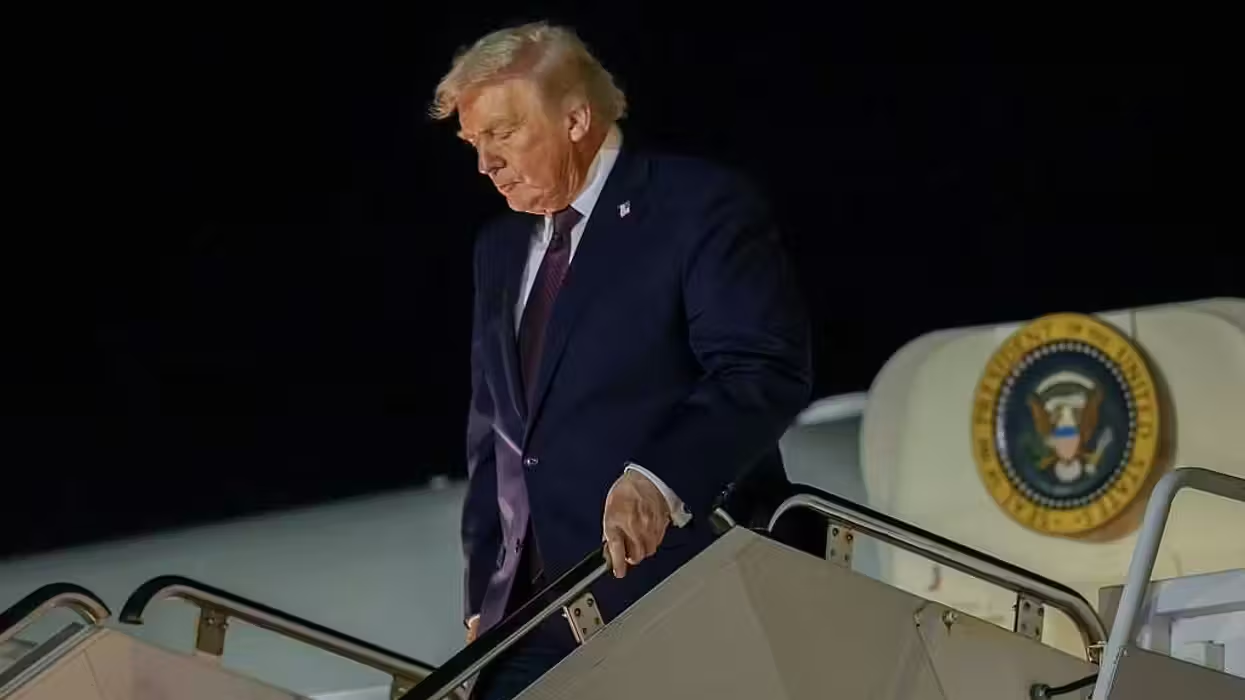
© 2025 Blaze Media LLC. All rights reserved.
When you're in a hole, stop digging: Bringing in more immigrant ag workers is not in our national interests
April 13, 2020
Daniel Horowitz has written of the mixed messages that the Trump administration has sent on immigration. The president has done much to prove the legitimacy of his intent to see the immigration laws enforced, most especially at the border — but the picture becomes considerably more complex where foreign guest workers are concerned.
Ever since Congress dropped the hot potato into the executive branch's lap by “authorizing” the Department of Homeland Security (DHS) to exceed statutory caps in various guest worker programs when deemed in the public interest — thus cravenly ensuring that the blame institutionally accrues to somebody other than Congress — the DHS has routinely done exactly that, year after year, despite the fact that there is precious little empirical evidence that any significant interest has been served, beyond the demands of corporate employers and “Big Ag,” whose bottom lines are immeasurably improved by a workforce of pliable, cheap foreign labor.
Perhaps the desire to increase the flow stems from the president's own background as a businessman and a user of foreign guest workers, but it's an instinct shared by his current DHS secretary, Chad Wolf, who was a swamp lobbyist on behalf of such programs before migrating into government as a protege of former DHS Secretary Kirstjen Nielsen. But whatever the impetus, it's a significant blind spot.
Some of my colleagues at the Center for Immigration Studies (CIS) have also been raising the alarm about the apparent single-mindedness of the DHS in going forward with guest worker admissions in a number of categories, in some cases going so far as to eliminate required processes to facilitate entries, just as the Wuhan coronavirus descended in earnest upon our country. Even the usually reliably liberal Politico published an article commenting on this dissonance.
It was not until the nation was stunned by a collective 10 million new applications for unemployment in a two-week period that the White House seems to have belatedly recognized the peril this poses to the president's re-election bid and that the DHS was shaken out of its somnolence enough to halt processing of at least some of the guest worker program admissions. Not so, though, with farm laborers.
The president said in a videotaped press briefing on April 1:
We want the farmers to be able to get people that have been working those farms for years, or we’re not going to have farms. So they’re going to come in. And they’re going to be given a certain pass and we’re going to check them very, very closely ...
Certainly farmers and their powerful lobbying associations would like us to believe in the notion that without those workers there wouldn't be farms, but is that true? There's ample cause for doubt. Even the Congressional Research Service, renowned for its understated and decidedly neutral stances on most immigration matters, no doubt as a matter of survival since its yearly budgets depend on not antagonizing either party, concluded in a December 2009 report that foreign farm worker programs depress wages and drive away a significant portion of domestic workers who, in a perfectly rational cost-benefit analysis, decide that they can't afford to work at such wages.
But there's also another, darker side to the equation: Even the most casual scrutiny of stoop laborers in the fields and stretch laborers in the orchards reveals an appalling array of substandard and unsafe living and working conditions. To the modern mind, these conditions seem like, and in many ways are, much akin to peonage. There are federal rules on the books ostensibly to prevent this, but they are minimal, frequently unenforced, and generally unenforceable for a variety of reasons.
There's also room to doubt whether the federal government has the wherewithal to “check them very, very closely” as the president suggests.
- How, exactly, will that happen when their entry is being expedited without even interviews by State Department consular officers?
- How will their health be monitored, not only before, but after entry? There aren't enough masks or testing kits for the general population as it is.
- Will Public Health Service officers be dispersed to the fields and orchards of America to conduct ongoing virus checks on the tens of thousands of alien farm workers? Doubtful.
- Will these entrants practice safe social distancing on their own, post-entry? Equally doubtful.
To justify waiver of interviews and other normally standard visa adjudication measures, State says the entry of these foreign farm workers is a “matter of national security.” But as CIS director Mark Krikorian has observed, if we are so reliant on foreign workers to supply our food, there's something wrong that needs to be fixed.
Clearly, reducing reliance on foreign farm workers is the right thing to do both morally and as a matter of national security. So what's to be done, and how? A survey of growing and harvesting practices globally reveals an astonishing variety of mechanized equipment that can replace, or at least substantially reduce, human labor. Such mechanization has not been adopted as widely in the U.S. as it could be, at least in part because farmers have become addicted to cheap foreign laborers willing to work in abysmal conditions without complaint. It's a great way to avoid massive capital investments. And, in fairness, smaller agricultural operations find it difficult to commit to that kind of financial investment. But there are ways to confront this inability.
Congress is noodling with at least one, probably more, coronavirus “relief” bills that provide a potential avenue. If, for instance, there is an infrastructure bill (which the president has signaled he supports), then it would be easy enough to create a division within that bill that provides low-cost loans, tax credits, and other incentives to growers and farmers for the specific purpose of procuring mechanization that eliminates their need for stoop and stretch labor. In return, they would agree to forgo reliance on guest worker programs. It's not a panacea, but it would be a good beginning.
Want to leave a tip?
We answer to you. Help keep our content free of advertisers and big tech censorship by leaving a tip today.
Want to join the conversation?
Already a subscriber?
more stories
Sign up for the Blaze newsletter
By signing up, you agree to our Privacy Policy and Terms of Use, and agree to receive content that may sometimes include advertisements. You may opt out at any time.
Related Content
© 2025 Blaze Media LLC. All rights reserved.
Get the stories that matter most delivered directly to your inbox.
By signing up, you agree to our Privacy Policy and Terms of Use, and agree to receive content that may sometimes include advertisements. You may opt out at any time.






